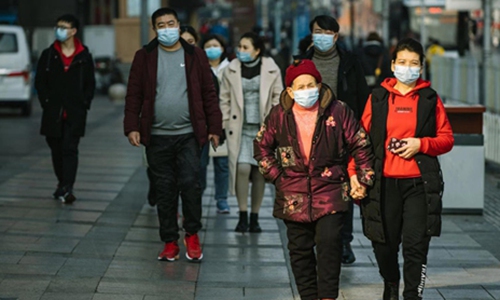
Visitors wearing masks walk along Wangfujing Street in Beijing on January 25 amid the outbreak of novel coronavirus in Wuhan. Photo: Li Hao/GT
If there is a silver lining from the novel coronavirus outbreak in China, it's that it shed light once again on the necessity, importance and indispensability of healthy media as a key player in society.
This call, of course, has been made in vain numerous times by some wise and brave people in China in the past. But this time, I have an inkling that the recent events may eventually bring some change. After all, this is a time when misinformation can set off a crisis and even countries that have deployed censorship of the mainstream media and the internet are not immune.
The first ever entry I posted on Twitter, in June 2013, was: "a lesson China should learn. The best way to fight against internet rumors is to lift the censorship of traditional media." It was triggered by a social uprising in Turkey that escalated because of misinformation on social media when that country's traditional media, facing censorship, offered little information about the protests to the information-hungry public.
To be fair, China has offered greater freedom of speech during this epidemic than in previous health crises. Searching key words like "coronavirus" and "Wuhan" (the epicenter of the virus) online won't lead you to a 404 error code, and traditional media outlets are also allowed to cover the epidemic rather than being ordered to stay away. In the past week or so, WeChat has been almost taken over by coronavirus-related posts.
But after many years of strict restrictions, traditional media has lost some trust with the Chinese people. In the past few years, some major incidents were first revealed on WeChat rather than by TV and print media organizations. As a result, WeChat has replaced traditional media to become a major, and sometimes the only, platform that the Chinese public relies on for information.
Although many traditional media outlets have their own WeChat accounts, their reports of the epidemic are easily outnumbered by the posts and reposts from anonymous WeChat users. There is, of course, a big downside. These posts can often offer questionable allegations and tips such as one that said corpses were exposed in the open air at Wuhan's hospitals or that the infection can be cured by simply drinking garlic-infused water. The fear index among ordinary people can quickly shoot up as a result. There is a real chance that some people got infected because they suddenly thought their mild cough or cold was the virus and then mixed with those who really had it as they waited for hours to be seen by doctors.
It is true that misinformation is rampant in the US too. Even the media sometimes feels handcuffed in front of the tsunami of misinformation online as they often have no other option than to repeat a rumor while trying to debunk it. And traditional media don't win the trust of all their readers either, especially during the current charged political climate. But in the US, even those who attack the media with the catchphrase "fake news" every day know that if big breaking news doesn't appear in traditional media outlets, it may not be true.
That's why when retired basketball giant Kobe Bryant was killed in a helicopter crash on January 26, many fans were questioning until they traced the news in the social media posts to trustworthy traditional media outlets. In addition, when a post on WeChat said an infection of the coronavirus was confirmed in the Chinese-dominated community of Flushing in New York, many WeChat users there warned fellow Chinese in their chat groups to not panic and wait for confirmation or denial in the local Chinese language media outlets. It turned out to be false.
Traditional media may not be perfect as their sensation-chasing stories often lead to over-coverage of certain types of news and under-coverage of other types. Still, news processed by professionals trained to take a check-and-balance approach may be more reliable than ordinary observers and commentators on social media. The latter can be dutiful witnesses but often present the picture without context and, therefore, can easily mislead people.
It may take a longer time to rebuild media credibility than destroy it. But the process has to begin now, at least because climate change and humans' own recklessness are all but certain to cause more natural disasters in the future. Once journalists don't have to spend their time on figuring out what higher management will allow them to report about, they can play a key role in not only keeping the general public informed but also keeping unnecessary fear at bay.
Some may be concerned that under constant and unfettered media scrutiny the images of the government and the country can be damaged by endless criticism. But this can be solved by establishing a functional system of government media offices whose job is not only to answer enquiries from the media but also to defend and polish the image of their employers. The game is fair only when all parties follow the same rules and are allowed to speak for themselves.
Isn't that what "checks and balances" really mean?
The author is a New York-based journalist and Alicia Patterson fellow. rong_xiaoqing@hotmail.com




